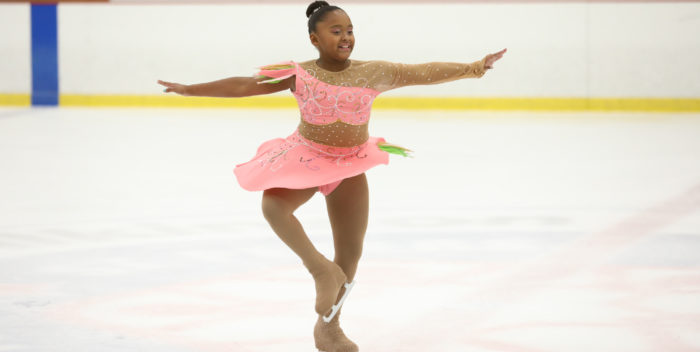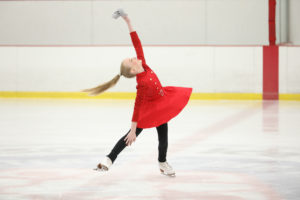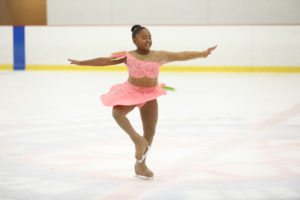Skating Competition Results & the Bigger Picture
Do you know that there are basically only five scenarios that are likely to occur during any skating competition event? If you can learn to handle each of these situations, then you will be able to cope with anything at any skating competition.
Here’s what can happen:
Your Day Your Skate Your Placement
- You can have a great day Skate your best Place first
- You can have a bad day Skate your worst Place last
- You can have an OK day Skate in the middle Place in the middle
- You can have a bad day Skate your worst Place first
- You can have a great day Skate your best Place last
Some skaters, coaches and parents emphasize getting first place, so anything else might seem like a failure to them. But it is important to use all of these different situations to expand your perspective and goals for skating — and for life! Take a look back at your overall competition career — consider many events, many competitions, for many years to get a true picture of your success in the sport of ice skating.
Of course, the easiest of the scenarios to justify (but perhaps not to accept) are Nos. 1, 2 and 3, because you seem to get what you truly deserve.
The next easiest to accept is No. 4, because that is a gift— and everyone likes presents!
The most difficult to accept and justify is No. 5, because it is so totally unexpected and seemingly undeserved. Even your coach and parents might not understand how this result is possible when you did a great job and skated your best performance.
As an ISI national event referee of more than 36 years, I can tell you that this situation happens at every single competition, everywhere.
How can this happen? Actually, the answer to this question is easily explained:
a) The three judges who were sitting on the stand might not have seen the program as you thought they would.
b) Maybe all the skaters in the event were “very close” and there was only a total of .1 between each skater from first to last place.
c) Maybe there were different “good things” and different “bad things” about everyone’s program and the judges’ scores were all over the place (depending on their own specific judging criteria), producing no clear-cut “winner. ” In this case, the computer had to sort out the wide variety of scores and it all “came out in the wash.”
The much more difficult (and more important) question is: Why did it happen to me? That is the big question that needs some critical thinking and objective evaluation.
Many skaters, parents and even coaches begin to complain about the competition results while only thinking about that one skater’s performance. This is a huge mistake.
You cannot objectively begin to evaluate the placement until you first objectively observe all of the other skaters’ performances within your event group.
Also, you cannot fully begin to understand all of the outcome possibilities until your coach has the experience of sitting on the judge stand for several hours, making a decision as to whether this flip jump was better than that one, which spin was better, etc.
Only after you take into account these other two perspectives can your entire outlook change, allowing you to better understand how this could happen.
Another note about competition results: While everyone usually likes to be “competitive” and see good results, I have never known of a single ISI competition either making or breaking any skater’s career. All skaters, parents and coaches should always keep the focus on the bigger picture.
Broaden Your Horizons!
Remember, each individual ISI competition event is specifically designed to improve one aspect of a skater’s total development. The wider variety of experiences, the better skater you will become.
Technical events (such as Tots-Delta, Freestyle, Open Freestyle, Stroking, Solo Compulsories and Jump & Spin) will help improve technical skating skills including jumps, spins and other skating maneuvers.
Artistic and theatrical events (such as Artistic, Spotlight and Rhythmic) will help improve musicality and performance skills.
Specialty events (such as Footwork and Interpretive) focus on connecting moves and help you think “on your skates.”
Partner events (such as Couples, Pairs, Dance, Couples Spotlight and Jump & Spin) help you learn to work together with other skaters while having fun, to achieve a goal such as a test or competition performance.
Group and team events (such as Ensemble, Family Spotlight, Kaleidoskate, Pattern, Production, Synchronized, Team Compulsories and Team Surprise) give a sense of camaraderie and working together.
“Fun” events (such as Surprise and Team Surprise) help you release stress and truly enjoy your time on the ice.
It’s not a good idea to put all your “eggs in one basket” when it comes to your competition event experience. If you only enter one Freestyle event and have a bad day, that probably won’t be a very positive competition experience.
But if you enter, say, four events, and you get first place in two, third place in one and fifth place in one, you have still had a very successful weekend and you will enjoy all four of your medals or trophies. Many additional events can easily be done without much additional practice, and most competitions also give a discount for multiple event entries.
And speaking of the bigger picture, if you enter an average of three competitions a year for five years (15 competitions total) and place in the top half in 10 to 12 of them, you’ve had a very successful competitive career!
Have FUN — AND SK8 GR8!
Randy Winship is general manager of Pasadena Ice Skating Center, serves as the chair of the ISI Skating Programs and Judging Committee and is the District 15 representative on the ISI board of directors.

 MY COACH ROCKS
MY COACH ROCKS TEAMS IN SYNC
TEAMS IN SYNC EXPRESS YOURSELF
EXPRESS YOURSELF FOCUS ON ARCHIVES
FOCUS ON ARCHIVES COMPETITORS’ CORNER
COMPETITORS’ CORNER NEWS & NOTES
NEWS & NOTES








